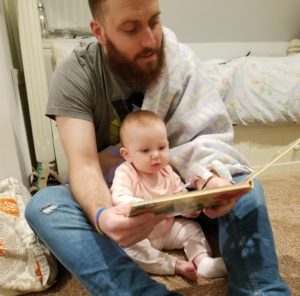Patrick Chung from Aimee Ketchum on Vimeo.
Don’t be offended mommies, but research shows us that daddy’s early interactions with baby are a higher predictor of future language and academic skills. In other words, the more daddy reads to your baby, sings to your baby, and talks to your baby, the smarter your baby will be!
Patrick Chung, two time Super Bowl winner and Safety for the New England Patriots reads to his baby every day! He knows the value of reading, singing, and talking to his baby. This video is from the intro to the popular Word Gap App. Research tells us that moms read books to babies and sing to babies more often than dads, but dads typically use higher quality language and are better at engaging the baby.
 Studies also show that moms and dads are equally playful with babies and small children, but dad’s playfulness is more predictive of future language skills. Daddies, read to your babies! Don’t be shy about singing to her as you put her to sleep, saying nursery rhymes as you change diapers and making up stories as you feed him lunch. Use high quality language, not baby talk, encourage eye contact, and pause between sentences to give your baby a chance to respond. Babies start to understand the pause and flow of a conversation as early as three weeks. When you pause they understand that it is their turn to make noises. Respond to her noises and have an exchange back and forth. This is so good for the language centers of the brain.
Studies also show that moms and dads are equally playful with babies and small children, but dad’s playfulness is more predictive of future language skills. Daddies, read to your babies! Don’t be shy about singing to her as you put her to sleep, saying nursery rhymes as you change diapers and making up stories as you feed him lunch. Use high quality language, not baby talk, encourage eye contact, and pause between sentences to give your baby a chance to respond. Babies start to understand the pause and flow of a conversation as early as three weeks. When you pause they understand that it is their turn to make noises. Respond to her noises and have an exchange back and forth. This is so good for the language centers of the brain.
Last year, Zero to Three conducted a survey about parent’s perspectives about development and the findings from daddies might surprise you. 90% of dads report that being a parent is their greatest joy. 85% of dads say being a father is the best job in the world. 73% of dads say their lives began when they became a dad and 62% of dads want more information on how to be a good dad. 84% of parents believe that children are better off when both parents are involved, but 64% of moms and dads agree that dads don’t get enough credit for their involvement in raising and caring for young children.
This study showed us that dads do see the value of reading to their children as 46% of dads report that they read to their children more than their dads read to them. 40% of dads would like to be more involved with raising their children but feel their partner interferes with their involvement. So, dads are ready and willing! Moms, hand that board book over! Have a glass of wine and let daddy do the bedtime routine tonight!
References:
Cabrera. N., Tamis-LeMonda, C. (2013). Handbook of Father Involvement: Multidisciplinary Perspectives, Second Edition. Routledge.
Cabrera, N. J., Fagan, J, & Farrie, D. (2008). Explaining the Long Reach of Fathers’ Prenatal Involvement on Later Paternal Engagement. Journal of Marriage and Family, 70(5), 1094-1107.
National Parent Survey Report. (2016). Zero to Three. https://www.zerotothree.org/resources/1425-national-parent-survey-report.
Schwab, Rowe, Cabrera, & Lew-Williams. (2018). Fathers’ repetition of words is coupled with children’s vocabularies. Journal of Experimental Child Psychology,166, 437-450.

